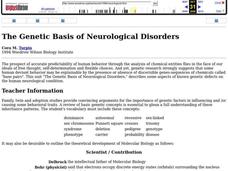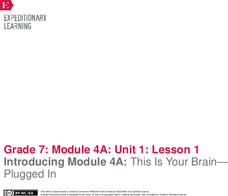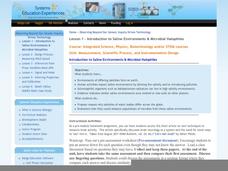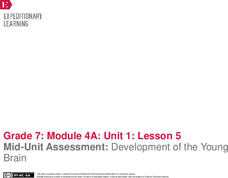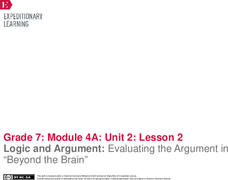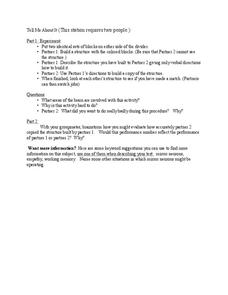Curated OER
The Genetic Basis of Neurological Disorders
Students explore neurological disorders. They examine the presence and absence of discernible genes. Students describe neruological diseases and draw faces of affected persons. They play a human neurology disorders learning game.
Curated OER
The Talk Show: A Bioethical Dilemma About Neurological Disorders
Students explore neurological societal problems. They research, collect information and assess the ramifications of ethical, economic, political, and social issues. During a talk show simulation, students present their decisions.
College Board
2017 AP® Psychology Free-Response Questions
How does psychology affect other parts of people's lives? Scholars consider scenarios such as how stress affects a musician's audition or to what extent is a person's eating behavior connected to neurology. Analyzing such questions from...
EngageNY
Introducing Module 4A: This Is Your Brain—Plugged In
What does brain science reveal about teens and decision making? Scholars watch a short video and participate in a gallery walk to pique their interest and curiosity about the topic. Next, they begin reading an informational article about...
Curated OER
The Genetic Basis of Neurological Disorders
Students describe some aspects of known genetic defects on the human neurological condition. They participate in a variety of exercises including drawings, games, and analogies.
Curated OER
Neurology Lessons
Students create a model of a neuron using household items. They bring these items to school for model construction. Students utilize the Internet and other sources to categorize assigned chemical/neurotransmitter. They also utilize...
Curated OER
AP: Chapter 48: Nervous System
Human anatomy enthusiasts trace neurological pahtways in word and on a diagram, describe action potential of a nerve impulse, and identify the organs in the nervous system. Provide this to your biology class as a review before...
Institute for Systems Biology
Introduction to Saline Environments & Microbial Halophiles
If you do not mind wading through unrelated headings (This is not for a physics or STEM course, as it states.) and content (The lesson opens with an article about neurology, not halophiles.), then you will find a valuable resource on...
Curated OER
Three is a Toxic Number
Future public health advocates read a case study of a combination of water pollutants that may be linked to autism. The class is split into three groups, one to research each of the suspected chemicals. The look at how each one affects...
Curated OER
Roots: The Ancestry of Modern People
High schoolers investigate the models for the origin of modern humans and the conditions that facilitate speciation and evolution. The classification and nomenclature of hominid species is also examined.
Curated OER
The Man Who Mistook His Wife for a Hat
Four scenarios of unusual human behaviors are given to your psychology class. Based on their knowledge of brain anatomy and function, they consider what parts of the brain might be affected in order to result in the behaviors. This case...
University of Minnesota
Blind Spot
Your eyes each work independently, so how do we only see one image? The quick hands-on experiment encourages young scientists to test their blind spots on each eye individually. After learning where the blind spot is and why it exists,...
University of Minnesota
Do the Stroop
The Stroop test helps diagnose executive function disorders when used in conjunction with other tests. Reading color words and identifying colors seem like basic skills, but the Stroop test may show otherwise. Scholars work with a...
Curated OER
The Brain’s Inner Workings
Do you want to learn about how you learn? Help pupils become the best learners they can be by teaching them how their brain works. The resources available include videos about brain structure and a study guide full of activities that...
K20 LEARN
What Lies Beyond Talent? Mindset And Neuroplasticity
Individuals' views of their learning processes largely affect how they learn. An engaging activity provides your classes with tools to analyze their own views of learning. Using an online game, they explore the concepts related to a...
College Board
2015 AP® Psychology Free-Response Questions
To what extent is hyperactivity related to sugary treats at a birthday party, and to what extent is it caused by other factors? What goes into a person's adjustment to a new home? Case studies explore questions like these and offer...
College Board
2016 AP® Psychology Free-Response Questions
What conditions influence a student's performance on a high-stakes test? What is the mental health aftermath of a car accident? Case studies examine these and similar questions. Pupils also sharpen their test-taking skills as they work...
EngageNY
Identifying Main Ideas and Supporting Details: What’s Going On in the Teenage Brain?
What's going on in the teen brain? Pupils consider the question as they continue reading an informational article about the topic. While reading, they use a Thinking Log worksheet and an anchor chart to track their understanding of...
EngageNY
Comparing Text to Multimedia: Understanding How the Brain Changes
Learners explore how the human brain changes over time, comparing an interactive web page about brain development to a text-only version. Additionally, pupils continue reading an article about teen decision making, analyzing the main...
EngageNY
Analyzing the Main Idea in Video: Understanding the Limbic System
It's time to put on those thinking caps and analyze the brain! Pupils watch a video about teenage brain development, using a note-catcher to capture their thoughts about the main idea. Finally, they select two pieces of information from...
EngageNY
Mid-Unit Assessment: Development of the Young Brain
Scholars view a video clip about adolescent brain development and work with partners to identify the main idea and supporting details. Next, as part of the mid-unit assessment, pupils watch another clip from the video and complete a main...
EngageNY
Logic and Argument: Evaluating the Argument in “Beyond the Brain”
The brain is not the mind. Scholars explore the claim by reading an informational article about neuroscience research, "Beyond the Brain." As they read, they answer text-dependent questions and complete an anchor chart to evaluate...
Cornell University
Shedding a "Little" Light on Cancer Surgery
Many types of cancer treatments now depend on nanotechnology—a big "little" discovery. Scholars begin by removing "malignant" tissue from simulated brains, one using fluorescent markers thanks to nanotechnology and one without. This...
University of Minnesota
Tell Me About It
Have you ever tried following confusing or incomplete directions? In a hands-on experiment, partners give and follow directions to build a structure. Scholars apply their years of experience taking instructions to prove they know the...


